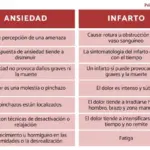
Anxiety is a natural defense mechanism of the body, which is activated when we feel in danger, whether in an emotional or physical sphere or both.
When we interpret something as a threat, the adrenal glands release adrenaline, a hormone and neurotransmitter that increases heart rate, constricts blood vessels, dilates airways and, in short, prepares us to flee or face danger. The half-life of adrenaline in plasma is 2-3 minutes, so its effect is very limited.
On the other hand, Cortisol is the substance that is actually known as “the stress hormone.”. This glucocorticoid prepares us for more long-term dangerous situations, causing the mobilization of nutrients to the muscular environment, regulating local inflammation levels, decreasing bone synthesis and many other things. One of the objectives of cortisol is to direct stored body energy towards the locomotor system, in order to have the body prepared for any threat.
The problem with this last physiological response is that it can occur in the long term, which causes deleterious effects on the body. Being a glucocorticoid, this substance is immunosuppressive, which translates into greater ease in contracting certain common pathologies, such as flu and colds. In addition, it also causes long-term intestinal imbalances.
To avoid the establishment of a high level of cortisol in your body due to continued stress, here you will see some key ideas about how to manage anxiety in our daily lives.
How to manage pathological anxiety in our daily lives
First of all, it is necessary to clarify a key concept: Anxious emotional state is not always bad, as long as it responds to a specific stimulus. Many techniques can be taught to control momentary stress from home, but if it is established in the long term, help must come from a medical professional. Therefore, it is essential to differentiate a sporadic anxiety disorder from a generalized anxiety disorder (GAD).
As indicated by professional sources, Anxiety disorders are the most common psychological problems in the European Union (EU), with an annual prevalence of 14% of the population and an average of 61.5 million people affected. According to the Diagnostic and Statistical Manual of Mental Disorders (DSM-V), published by the American Psychological Association in 2013, the diagnostic criteria to detect GAD are the following:
If you have seen yourself reflected in this diagnostic criterion, your anxiety management is not found within you, but in professional, psychological or psychiatric help. GAD is treated with selective serotonin reuptake inhibitor drugs (SSRIs), tricyclic antidepressants, benzodiazepines in the worst moments of the condition, buspirone and/or beta blockers in some cases.
Beyond the pharmacological front (very important in the first year of treatment), psychological therapy, generally of a cognitive-behavioral type, is also essential. These types of long-term approaches will help the patient identify and control “maladaptive” behavior patterns that lead to constant stress, which may lead to improvement over time. The action of medications and joint therapy is essential to address GAD.
How to manage non-pathological anxiety
Managing sporadic anxiety due to a specific situation is much simpler than treating a clinical condition, because as we have seen, this sensation is normal and usually resolves on its own when the stressor disappears from the environment. In any case, there are a series of keys that can be followed so that nerves do not take control in a given situation.
First of all, it should be noted that Respiratory rate is one of the most important things to keep under control in times of tension and stress. When we breathe more than necessary, an abnormal blood gas exchange occurs, which results in a loss of carbon dioxide in the blood (and excess oxygen).
This can lead to a clinical condition known as “respiratory alkalosis,” which results in dizziness, vertigo, confusion, shortness of breath, and chest discomfort. To avoid reaching this point, it is necessary to maintain complete control over your breathing. If your nerves get the better of you, lie down and breathe deeply, with your hands on your diaphragm, and count to 10 in each respiratory cycle (inhale-hold-exhale).
Beyond this, it is also usually recommended to go out and exercise after a moment of very marked stress. The release of endorphins and the burning of excess energy help a lot to manage sporadic anxiety.. Furthermore, when running or walking, breathing is consciously regulated. All this helps avoid respiratory alkalosis and entry into states of panic.
In summary, pathological anxiety must be treated pharmacologically and psychologically, while physiological anxiety can be addressed from home. In any case, it never hurts to go to a psychology professional to obtain the emotional tools necessary for daily life, regardless of whether you have a psychological condition or not.








